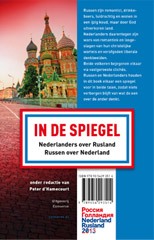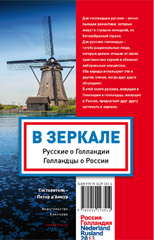"Russia is a world in itself"
Journalist Peter d'Hamecourt on the Russians and the Dutch
If anyone can paint the Dutch image of the Russians, it is Peter d'Hamecourt. The former television journalist covered Russia from 1989 to 2008. He lost his heart to the country, and continues to observe it as a theatregoer. "Russians find the domesticity of the Dutch endearing. And the Dutch envy the Russians for their passion."
The Dutch are held in high regard by the Russians, there's no denying that. What is less clear is what the origins of these warm feelings are. One man who can cast a light on this is Peter d'Hamecourt. The journalist has been watching the country closely for the past quarter of a century, first as a commentator for the Dutch national TV news, nowadays more in the background. Russia held so much fascination for him that he stayed on after his correspondent-ship. He has a "dacha" (country home) in the Kaluga Province of Russia. The journalist has just completed a book about the Netherlands and Russia. "There is absolutely no doubt that the two get along," said d'Hamecourt. "Russia does not have many friends in Europe, but the Netherlands is an exception. Russians want things to be right and the Dutch are the same. So there's no stopping them."
D'Hamecourt finds it difficult to explain exactly where these close relations stem from. The visit to the Netherlands of Peter the Great is often mentioned in this context. But he has doubts as to whether relations were that close from the outset, pointing out that diplomatic ties were initially ruffled. And he does not believe that the Netherlands made that much of an impression on the legendary tsar. "I think that's mainly myth-building. Because Peter is likely to have found the Netherlands pretty dull and bare. There were no splendid palaces such as the ones in Paris that he visited during his infamous carousing sessions. 'What they call a palace in the Netherlands, we would call a pigsty,' as Anna Paulowna, the Russian wife of King William II, put it later in a letter to her mother."
Endearing domesticity
D'Hamecourt believes that the good relations stem from cooperation in trade and shipping, which fostered a mutual respect and admiration for each other's rich culture and know-how. Furthermore the two nations have a certain connection, underpinned by an appreciation of differences, according to the writer and journalist. "The Dutch envy the Russians and their passionate, disorganised lives and also their penchant for the extreme. While the Russians are charmed by the neat and tidy open-air museum that is the Netherlands. Russians find the Dutch endearing, because they are very domesticated and have a genuine home. When Dutch people return to their country, they do not just go back to their fatherland but 'go home'. 'Welcome home,' read the big letters on the banners at Schiphol airport. After a three-week winter sports holiday the Dutchman gets a welcome-home worthy of a pole explorer."
"After a three-week winter sports holiday
the Dutchman gets a welcome-home
worthy of a pole explorer"This feeling of returning to a comfortable nest is unknown to most Russians, says d'Hamecourt. The journalist believes that the fact that there is nowhere they feel really at home is linked to the turbulent history of their displaced and mixed people. "Instead of a 'home nation' Russians have 'a fatherland'. Patriotism is even taught as a subject in school. That would be unthinkable in the Netherlands." What unites Russians is not a home but their rich culture and love of nature. "Parents take their children to the Tretyakov gallery to instil the new generation with the love of the boundless Russian landscape, as depicted in the wonderful paintings of Ivan Shishkin. Russians cherish their culture. Shishkin, Pushkin, Gogol, Scriabin, Tchaikovsky and Tolstoy - this what unites Russia. That and nature. They love their forests and their fungi: in mid-August gathering these is a kind of national madness."
The Russian's lot
If you want to do business with a Russian, don't try to rush things, says d'Hamecourt. Russians are not as time-conscious as the Dutch. "First you have to work on building a relationship. That takes time. In addition it is crucial to show an interest in Russian culture." The journalist further specified this by saying 'you have to show an understanding of the Russian's lot'. "Russians want acknowledgement for the long and hard road they have had to go. If you take a genuine interest in them, they hugely appreciate it. Russians are grateful – overcome even – if you speak their language. They really don't care if you make mistakes. It is unthinkable that a Russian would ever correct you."
In order to illustrate how hospitable and receptive Russians are to those who show an interest in them d'Hamecourt told the following anecdote. Once he stepped in for a Dutch professor scheduled to give a lecture to an audience of businesswomen in the agricultural sector. He used the long journey to the country to master the speech by the expert. Once he had arrived d'Hamecourt did not mention that he really was not knowledgeable on the topic. "My speech about the blessings of agriculture and livestock production in the Low Countries was well received. But answering the questions was tricky. Could I say how much milk the average Dutch cow makes? No. Not that this was held against me in any way. On the contrary: the ladies were very grateful to me for turning up. They still invited me along to a major agricultural exhibition as an 'agriculture expert.' Nobody blames me for not being quite what I purported to be. Once a Russian has taken you into their heart, it really doesn't matter."
'Russki avos'
"If you see how quickly trends can move in Moscow,
you won't believe your eyes"When doing business d'Hamecourt says it is important to bear in mind that the Russians are of a different nature. "The Dutch are down-to-earth and practical. They first create the conditions before going any further. For example: first roads, then business parks, then businesses. Russians may well do things the other way around. They like to philosophise and make ever more elaborate plans. In doing so they sometimes lose touch with reality. This is offset by the fact that they are good at improvising in a crisis. They have the ability to achieve a great deal in a short time. If you see how quickly trends can move in Moscow, you won't believe your eyes. There are lots of good examples of this in the catering sector; one day you simply can't get a decent cup of coffee, the next a thousand exclusive coffee places have sprung up. The same thing happened with trends such as sushi or lounge bars."
Another trait you have understand when doing business in Russia is 'the Russian maybe', says d'Hamecourt. "In Russia this is known as the 'Russki avos'. The term derives from 'avoska', a knotted string shopping bag dating from the Communist era. People always carried one of these 'maybe bags' with them in case they happened to come across something." As a country, Russia is more theatrical than the Netherlands, according to d'Hamecourt; people play parts and accept this of each other that this is so. They treat the truth with a certain degree of flexibility. "For example, I know a foreign businessman who complained about a landlord who kept pushing up the price of the rental contract. With no explanation. In cases such as this you must always stay polite, however unreasonable the proposal sounds. If you remain friendly, you have a good chance of reaching a reasonable agreement after all. The high 'maybe' content of the initial proposal is never discussed."
Those willing to accept the cultural differences can expect a whole new world to open up to them, according to d'Hamecourt. As far as he is concerned we should stop our desperate attempts to see Russia as an eastern part of Europe. "You really need to look at Russia as a different continent. A world in itself. Completely different from the rest of Europe. Just do as the Russians do. It is not Russia in Europe, but Russia and Europe. And that doesn't matter at all. We really need to start letting this sink in." .
Book: 'In the mirror'
The book In de spiegel, Nederlanders over Rusland en Russen over Nederland ('In the mirror, the Dutch on Russia and Russians on the Netherlands') will be published shortly to mark the Netherlands-Russia year in 2013. The book, which will appear both in Dutch and in Russian, sets out dispel tired clichés on both sides. The two sides hold up a mirror to each other with no topic being shunned, and holds contributions from seven Dutch and seven Russian authors. In addition to chief editor Peter d'Hamecourt, they are Vader Sergi Ovsjannikov, Jeroen Ketting, Nina Targan Mouravi, Aai Prins, Sasha Ourikh, Michel Krielaars, Sana Valiulina, Geert Groot Koerkamp, Leonid Zlobinski, Pieter Waterdrinker, Dr. Olja Tielkes, Ellen Verbeek/Derk Sauer and Lilja Zakirova. The book would not have been possible without the support of ING and other sponsors..

 Close
Close